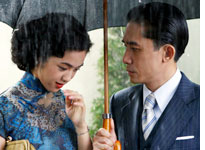Lust, Caution
Ang Lee's brilliant sexual politics.
To listen to Slate's Spoiler Special about Lust, Caution, click the arrow button on the player:
You can also click here to download the MP3 file, or you can subscribe to the Spoiler Special podcast feed in iTunes by clicking here.
After making the definitive—OK, the only—gay-cowboy romance in Hollywood history, what do you do next? With Lust, Caution (Focus Features), protean Taiwanese director Ang Lee (Crouching Tiger, Hidden Dragon; The Hulk; Brokeback Mountain) does something that's unexpected and truly daring. He takes a compact gem of a short story by Chinese writer Eileen Chang and spins it into a 158-minute saga of espionage, deceit, sexual humiliation, and something that could be perversely—but not untruthfully—called love.
The subtitled film begins in Hong Kong in 1942, as four jewel-bedecked ladies slap down tiles in a fierce-looking game of mah-jongg. In a masterful scene that crackles with unspoken tension and overlapping dialogue, we infer that the youngest of the players, Mak Tai-Tai (Tang Wei) is secretly involved with Yee (Tony Leung), whose wife (Joan Chen) hosts the ongoing mah-jongg group.
In an abrupt flashback to 1938, the affair takes on a political dimension: Mak Tai-Tai is in fact the false identity of a college student, Wong Chia Chi. After the shy, girlish Wong moves the audience to tears with a speech in a patriotic play, she's conscripted by the leader of a rebel group (Wang Leehom) to seduce Yee, a collaborator with the occupying Japanese army, and lure him to his death.
For nearly an hour, Lust, Caution plays like an exceedingly well-made but conventional wartime spy drama. But when the student group's plans are foiled by a sudden act of violence, which Lee shows us in a mercilessly protracted scene, the film turns into something rawer and stranger. The moral and political boundaries—good revolutionaries here, bad collaborationist guy over there—collapse as we witness the brutal tactics of both sides and as Wong and Yee slide into a sadomasochistic love affair.
Their first encounter is a dizzying shell game. First, Wong's calibrated performance as a coy seductress crumbles when Yee takes her with a violence bordering on rape. Then, even more disturbingly, the scene finishes with what feels like a mutual erotic surrender. Is Wong, the consummate actress, faking submission to ensnare her prey or experiencing real sexual abandon for the first time? Does Yee already suspect that his new mistress is a spy, or is his taste for sexual cruelty just an inevitable byproduct of his days spent torturing prisoners?
The mere fact that a sex scene can raise questions this complex points up the boldness of Lee's project in Lust, Caution. Most on-screen sex scenes could be replaced by a title card reading, "And then they had sex." But when his two leads go at it, Lee doesn't pan away discreetly to a lamp or show close-ups of their faces; he lets their savagely entangled bodies do the talking, and we (and they) emerge from the scene with a completely changed sense of who these characters are. Whether the NC-17-rated sex scenes are "real" or simulated has been the object of much speculation, but whatever Leung and Wei were up to on that closed set (where the 10 or so minutes of on-screen sex reportedly took more than 100 grueling hours to film), they're doing something very real as actors.
In fact, this paradox—that an actor is an artist who tells the truth by lying—is central to the movie itself. Tang Wei, making her film debut, gives a superb and unsettling performance as a woman whose only source of power is her ability to transform herself into someone else. In one scene, Wong takes refuge in a movie theater, where she weeps her way through an Ingrid Bergman film. Her identification with the melodrama hints at the romantic naiveté that will be her downfall and also reminds us of the college propaganda play where she first discovered her calling as a performer (and brought the audience to its feet shouting, "China will not fail!"). Lust, Caution is both a cannily constructed spy thriller and a grim kind of love story, but it harbors no illusions about the transformative potential of either revolutionary violence or sexual passion. In the end, the movie suggests, both politics and love may be inseparable from the lies we tell ourselves about them.

